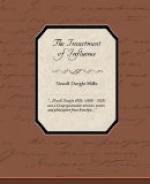Walter Scott believes in moral retribution. He tells us of a youth who deftly split an arrow at the point where it fitted the bow-string, that when his brother, whom he hated, should bend his bow the arrow might split and, rebounding, pass through his eye. Now it happened that the brother returned from the hunt without using his weapon. That night, alarmed at a commotion without, the youth seized his bow, and, chancing to strike upon that very arrow, was himself slain by the stratagem that he had wickedly planned for his brother. George Eliot, too, has dedicated her greatest volume to the study of this principle. The orphan child, Tito, is received into the arms of an adopted father, who lavishes upon him all his wealth. But when the youth was grown to full strength and beauty, one night Tito left his adopted father in slavery and fled with his gold and gems into a foreign land. Years passed by and, with his stolen wealth, Tito bought wife, palace, position, fame. He had sown falsehood and cruelty, and nothing seemed so unlikely as that he would reap a similar harvest. But one day the people discovered his falsehood and attacked Tito. A mob pursued him through the streets, and, knowing his strength as a swimmer, the youth cast himself into the River Arno. When Tito had swum far down the river to the other side, and, in his exhaustion, would go ashore, he looked up, and, lo! he discerned the gray-haired father whom he had injured trotting along the shore side by side with the swimmer. In the old man’s eyes blazed bitter hatred, in his hand flashed a sharp




